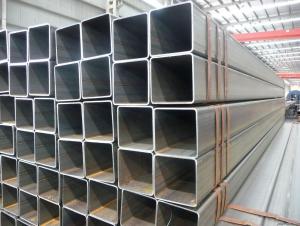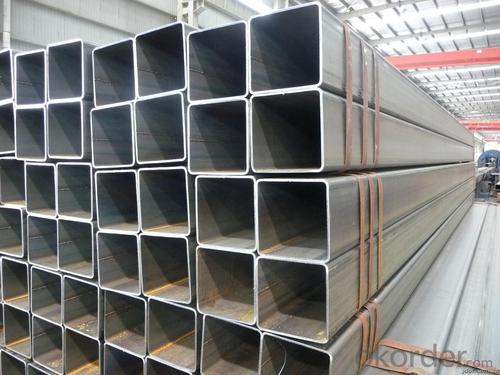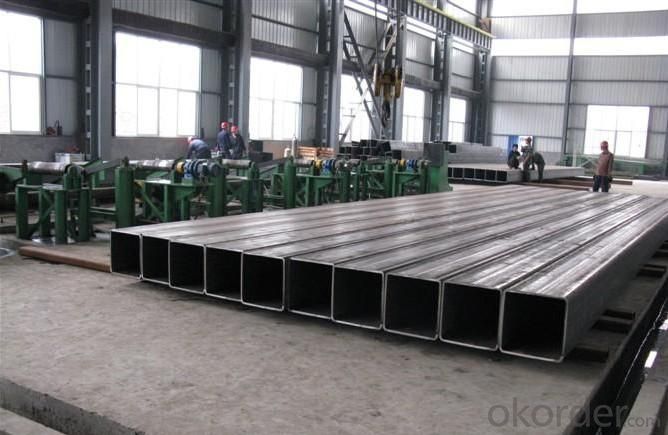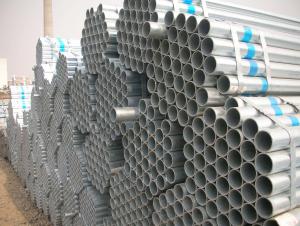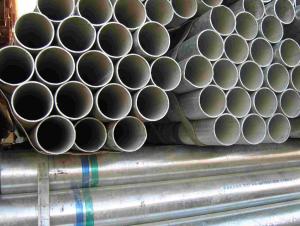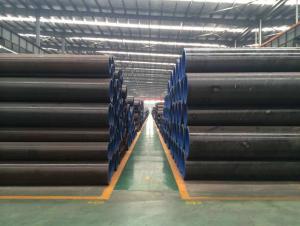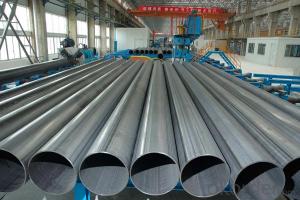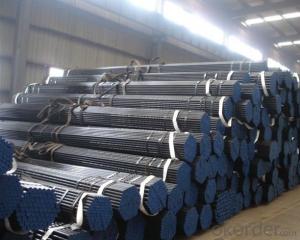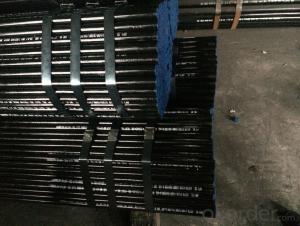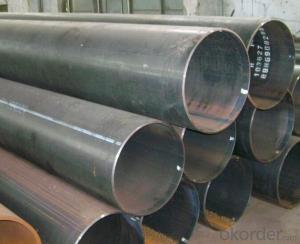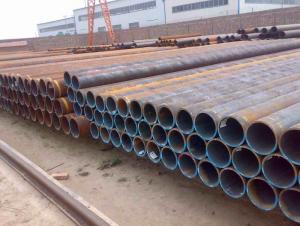Carbon ERW Welded Pipes-Square Tube And Pipe For Furniture ASTM A53 Hollow Section
- Loading Port:
- China Main Port
- Payment Terms:
- TT or L/C
- Min Order Qty:
- 50MT m.t.
- Supply Capability:
- based on order m.t./month
OKorder Service Pledge
OKorder Financial Service
You Might Also Like
1. Specification of ERW Welded Pipes-Square Tube and Pipe for Furniture ASTM A53 Hollow Section
1) Application: Greenhouse pipes, scaffolding pipes, transportation the ocean oil and gas, mechanical tube of ocean platform, power station, chemical industry and building, construction foundation piles, steel structure building, for low-pressur fluid service, steel structure bridges etc.
2) Standard: ASTM A53, BS1387, GB/T9711, GB/T390133) Steel Grade: Q195/Q215/Q235/Q345
2. Sizes of ERW Welded Pipe- Square Tube and Pipe for Furniture ASTM A53 Hollow SectionOuter Diameter: 1/2"x1/2"-16"x16''
Thickness:4.0-12.75mm
Length: As costumer's requirement
2. Packing & Delivery
Packing Detail: Packing in bundle with steel strips;with seaworthy package at the end; could be done with your requirement
Delivery Time: Within 30 Days after the reception of prepayment or L/C
3. Data Sheet
Standard: ASTM A53
Mechanical Properties
|
Standard |
Grade |
(MPa) |
(MPa) |
|
Yield strength |
Tensile Strength | ||
|
ASTM A53M |
A |
205 |
330 |
|
B |
240 |
415 |
Chemical Composition(%)
|
Standard |
Grade |
C |
Mn |
P |
S |
V |
Ni |
Cu |
Cr |
Mo |
|
Max |
Max |
Max |
Max |
Max |
Max |
Max |
Max |
Max | ||
|
ASTM A53M |
A |
0.25 |
0.95 |
0.05 |
0.045 |
0.08 |
0.4 |
0.5 |
0.4 |
0.15 |
|
B |
0.30 |
1.20 |
0.05 |
0.045 |
0.08 |
0.4 |
0.5 |
0.4 |
0.15 |
4. Products Showroom
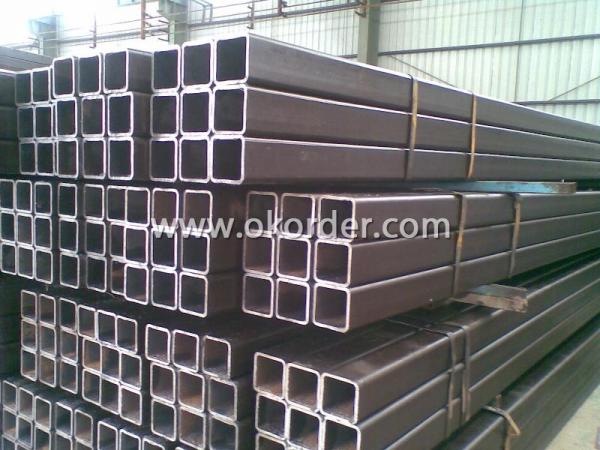
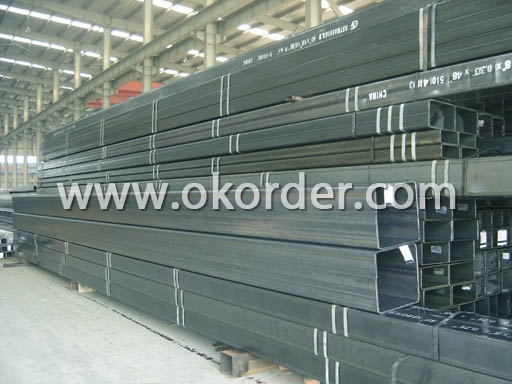
- Q: Can steel pipes be used for architectural purposes?
- Yes, steel pipes can be used for architectural purposes. Steel pipes are often used in construction projects for structural support, such as in the construction of buildings, bridges, and stadiums. They are also commonly used for architectural design elements, such as handrails, staircases, and decorative features. The durability, strength, and versatility of steel pipes make them a popular choice in architectural applications.
- Q: Are steel pipes suitable for underground chemical transport?
- Steel pipes are widely regarded as appropriate for transporting chemicals underground because of their high strength and durability. They have the ability to endure the pressure and weight of the soil above, rendering them impervious to harm or collapse. Furthermore, steel pipes possess corrosion resistance, which is vital when conveying chemicals that might react with or corrode other substances. They also have the capability to handle a wide range of temperatures, making them suitable for transporting chemicals that necessitate specific temperature conditions. Nevertheless, it is crucial to carefully consider the particular chemical being transported and seek advice from experts in chemical engineering or pipeline design to guarantee the compatibility of the steel pipes with the chemical and the implementation of any necessary safety precautions.
- Q: Are steel pipes resistant to electromagnetic interference?
- Yes, steel pipes are generally resistant to electromagnetic interference due to their conductive properties. The metallic nature of steel helps to create a shielding effect, preventing the penetration of electromagnetic waves and reducing interference.
- Q: Are steel pipes suitable for nuclear power plants?
- Steel pipes are an ideal choice for nuclear power plants. This is because steel is a commonly used material in the construction of these plants, thanks to its exceptional mechanical properties, high strength, and durability. Various applications in nuclear power plants rely on steel pipes, including the transportation of cooling water, hot gases, and steam. The steel used in nuclear power plants undergoes careful selection and testing to meet strict safety regulations and quality standards. This is crucial because these pipes must have outstanding resistance to corrosion and high-temperature environments. They are exposed to harsh conditions such as high pressure, high temperatures, and radioactive materials. Moreover, steel pipes have a long lifespan and require minimal maintenance. This makes them a cost-effective option for nuclear power plants. They can endure extreme conditions, ensuring the plant's safe and reliable operation. Additionally, steel pipes can be easily fabricated, installed, and repaired, which is vital for the efficient functioning of a nuclear power plant. In summary, steel pipes are highly suitable for nuclear power plants due to their strength, durability, resistance to corrosion, and ability to withstand extreme conditions.
- Q: How are steel pipes used in irrigation systems?
- Steel pipes are commonly used in irrigation systems to transport water from a water source, such as a well or a reservoir, to the fields or plants that need to be irrigated. These pipes are durable, strong, and resistant to corrosion, making them ideal for withstanding the constant flow of water and the harsh outdoor conditions. They are typically laid underground or above the surface, depending on the specific irrigation system design, and are connected to sprinklers or drip irrigation systems to distribute water efficiently and effectively to the crops or plants.
- Q: How are steel pipes used in the pulp and paper industry?
- Steel pipes are commonly used in the pulp and paper industry for various applications such as transporting water, steam, chemicals, and other fluids throughout the production process. They are used in the construction of pipelines, conveying raw materials, and transferring finished products. Steel pipes provide durability, reliability, and resistance to corrosion, making them suitable for handling the harsh conditions and corrosive substances found in the industry.
- Q: How do steel pipes perform in extreme weather conditions?
- Steel pipes perform well in extreme weather conditions due to their high strength, durability, and resistance to corrosion. They can withstand extreme temperatures, heavy winds, and harsh climates, making them a reliable choice for various industries and applications.
- Q: How are steel pipes used in the construction of oil and gas pipelines?
- Steel pipes are commonly used in the construction of oil and gas pipelines due to their durability and strength. These pipes provide a reliable and safe means of transporting oil and gas over long distances. They are used to create a network of interconnected pipes that can withstand high pressure and extreme temperatures. Additionally, steel pipes are resistant to corrosion, making them suitable for transporting corrosive fluids. Overall, steel pipes play a crucial role in the construction of oil and gas pipelines by ensuring the efficient and secure transportation of these valuable resources.
- Q: What is the lifespan of galvanized steel pipes?
- The lifespan of galvanized steel pipes can vary depending on various factors such as the environment, usage, and maintenance. However, on average, galvanized steel pipes can last between 40 to 70 years.
- Q: What is the difference between seamless and welded steel pipes?
- The main difference between seamless and welded steel pipes lies in their manufacturing process. Seamless pipes are made by piercing a solid cylindrical steel billet to create a hollow tube without any welding or joints. On the other hand, welded pipes are formed by rolling a flat steel plate and then welding the edges together to create a cylindrical shape. This welding process introduces a seam along the length of the pipe. Consequently, seamless pipes are typically considered stronger, more reliable, and better suited for high-pressure applications, while welded pipes are more cost-effective and commonly used for less demanding applications.
1. Manufacturer Overview
| Location | Hebei, China |
| Year Established | 1988 |
| Annual Output Value | Above One Hundred Million RMB |
| Main Markets | Main land; Southeast Asia; Middle East; Africa |
| Company Certifications | ISO 9002:2010;API 5L |
2. Manufacturer Certificates
| a) Certification Name | |
| Range | |
| Reference | |
| Validity Period |
3. Manufacturer Capability
| a) Trade Capacity | |
| Nearest Port | Tianjin |
| Export Percentage | 30%-50% |
| No.of Employees in Trade Department | 201-500 People |
| Language Spoken: | English; Chinese |
| b) Factory Information | |
| Factory Size: | 50,000 square meters |
| No. of Production Lines | Above 15 |
| Contract Manufacturing | Meicai Metal Trading Co.Ltd |
| Product Price Range | Average |
Send your message to us
Carbon ERW Welded Pipes-Square Tube And Pipe For Furniture ASTM A53 Hollow Section
- Loading Port:
- China Main Port
- Payment Terms:
- TT or L/C
- Min Order Qty:
- 50MT m.t.
- Supply Capability:
- based on order m.t./month
OKorder Service Pledge
OKorder Financial Service
Similar products
Hot products
Hot Searches
Related keywords
